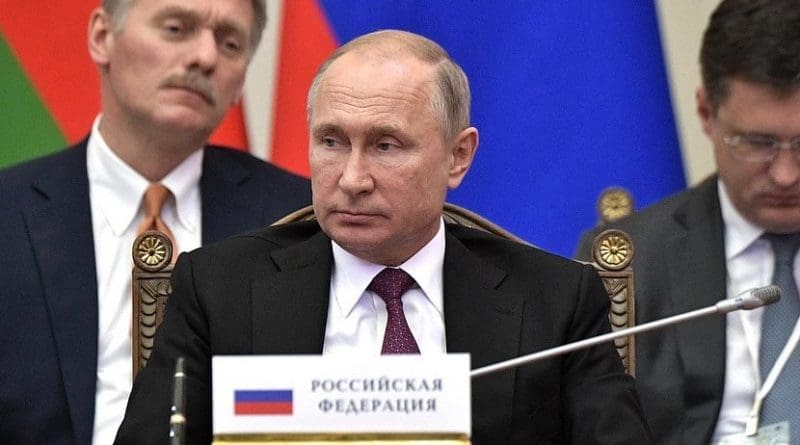Putin Seeks To Woo Asian Giants At Key Forum – OpEd
By Arab News
By Andrew Hammond*
Vladimir Putin is this week hosting the Eastern Economic Forum in Vladivostok — the latest Russian attempt to increase influence in its Far East. But this region is far from the only focus of Putin’s grand strategy to restore Russia’s geopolitical prominence from Asia-Pacific to the Americas, including Venezuela.
Some two decades after first assuming power, this approach has included gambits such as the annexation of Crimea in Europe and the Syrian intervention in the Middle East. This has generally — so far — played well for him domestically, helping the president win a new six-year term in 2018.
This week’s Eastern Economic Forum, which will host thousands of political and business attendees, will see Russia double down on re-energizing relationships with four countries in particular. These are India, China, Japan and Mongolia, with leaders from all four nations in attendance, including Indian Prime Minister Narendra Modi, Chinese Vice Premier Hu Chunhua, and Japanese Prime Minister Shinzo Abe.
Modi is being billed as the guest of honor this week and his and Putin’s broad-ranging dialogue, which will unnerve Washington, will see a number of economic and political deals inked. These include agreements in areas such as defense, trade, investments, industrial cooperation, energy, and connectivity.
Another notable guest is Abe, given the bilateral dialogue with Putin over their eastern interests. Both leaders have agreed to foster joint economic activities in the disputed islands off Japan’s northernmost main island of Hokkaido, which were seized by the former Soviet Union at the end of the Second World War. These islands are now controlled by Moscow but claimed by Tokyo. While the details remain complex, both appear to want to see progress toward a peace treaty settlement on this issue and accelerate economic cooperation.
However, it is perhaps China that enjoys the strongest ties with Russia right now. Possibly the most cited area of these warmer ties is the political and security front, but China and Russia also enjoy an extensive economic dialogue, which has deepened since Moscow’s annexation of Crimea.
Within the space of just a few days, the Russian president will therefore have met with three leaders from top world economies. This underlines his continuing political energy, which, extraordinarily, by the mid-2020s could see him having been in office for longer than all the Soviet Union’s supreme leaders other than Joseph Stalin. And, despite current protests in Moscow, his foreign policy has generally fueled his domestic popularity, at least to date, in much of Russia. But this has been mirrored by frostier ties with the leaders of multiple key countries, especially in the West.
A key question — now that Putin may be in power until at least 2024 — is how much significance he wants to place on rebuilding relationships with key powers from the US to France, Germany and the UK.
The question of rebuilding Russian’s relations with Europe is especially pressing after years of sanctions over Ukraine and Crimea; concerns over Moscow’s alleged extensive meddling in a suite of elections; and the attempted murders in England of former Russian spy Sergei Skripal and his daughter, which has been widely blamed on Moscow. The mood music between Russia and Europe is still tense, as shown at last month’s G7 meeting, where Paris, London and Berlin were skeptical about Donald Trump’s latest suggestion of readmitting Moscow to the club, which it had previously been a member of between 1997 and 2014.
This highlights that, while Trump remains president, perhaps the biggest area of continuing Russian foreign policy uncertainty is over US relations. Putin and Trump had hoped for a rapprochement, yet developments in 2017 and 2018, including the pressure the White House faced over the congressional and FBI investigations into alleged collusion with Moscow during the 2016 US presidential campaign, froze that potential window of opportunity.
However, it is not only domestic US pressures that are complicating bilateral ties. There have also been tensions between Moscow and Washington in the Middle East during the Trump presidency, including after US missile strikes targeted Syria in response to alleged poison gas attacks committed by the Damascus regime, which is propped up by Putin.
Indeed, previous US Defense Secretary James Mattis and then-Secretary of State Rex Tillerson were especially forceful in their criticism of Moscow at the time, with the latter saying that “either Russia has been complicit or simply incompetent” in Syria. The spike in Washington-Moscow tensions even saw Russian Prime Minister Dmitry Medvedev say the two countries were “one step away from” war and relations were “completely ruined.”
This week’s summit is Russia’s latest attempt to assert itself internationally. With continuing uncertainty over the direction of the relationship with the West, Putin is placing ever greater emphasis on Asia-Pacific, especially Japan, China and India.
- Andrew Hammond is an Associate at LSE IDEAS at the London School of Economics

